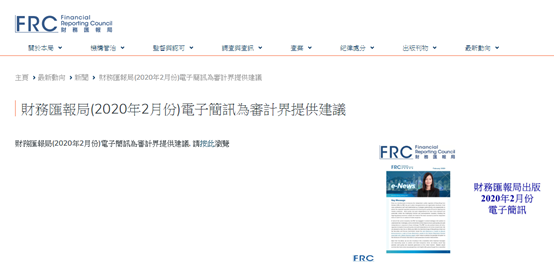
https://www.frc.org.hk/zh-hk/enews/202002/enewsletter_202002_en_Final_website.pdf
香港财务汇报局发表最新电子通讯,就2020年2月4日香港交易所与香港证监会联合发布的新指引,上市公司管理层、审计委员会、审计师,应合作一起评估疫情对上市公司业绩审计的影响。
特别是疫情对上市公司有否重大影响而需要调整、以及在财务报表中披露;审计师是否有足够的时间和资源在今年3月底前完成对上市公司截至去年12月底止的审计;以及如果预期审计可能延迟,有否无法解决的具体及实际障碍等。
审计师应特别注意上市公司无形资产的减值评估,包括商誉、收入确认、关联交易和异常交易等,有可能会增加不当会计或披露的风险。
通讯又提到,在现时充满挑战的金融和社会经济形势下,审计质量和审计独立性更为重要。
鉴于目前的疫情,我们谨提请各方,应注意一些关键问题和建议:
For auditors
Management may be under pressure to meet financialand operational goals such as earnings or revenue targets, financial ratio,loan covenants and others. Audit firms may be subject to the same pressure too.This may give rise to adopting practices which may be too aggressive or may notbe in compliance with relevant laws or regulations and professional standards.
Under such circumstances, audit firms andaudit engagement partners should recognise the importance of compliance withethical requirements and remind the audit engagement teams of the same. Theyshould ensure that their audit engagement teams are independent and exhibitobjectivity and integrity at any time.
Audit firms and the quality control systemresponsible persons should ensure their quality control systems provide an eectivecheck and balance for compliance with professional standards and other relevantrules and regulations, and that audit quality is closely monitored andappropriate consequential action is taken where appropriate.
Other note-worthy issues are also includedin the section ‘Reminder of key audit and accounting issues’.
For preparers of financialstatements
The board of directors, being the preparersof financial statements, have ultimate responsibility for the integrity andaccuracy of financial statements. They have the primary responsibility toensure that the finance function is appropriately resourced and has suitablyqualified sta to prepare financial statements that give a true and fair viewin accordance with the applicable financial reporting framework. They must alsoput in place necessary internal control to enable the preparation of financialstatements that are free from material misstatement, whether due to fraud orerror. The delegation to the audit committee of the oversight of financialreporting and the fact that there is an external audit do not absolve the boardof its obligations.
The current downward business environmentmay lead to rapidly deteriorating operating results and liquidity challengesfor some companies, particularly those in the catering, retail, tourism andconsumer-based industries. Directors, having a key responsibility to approvethe assumptions adopted by the entity and the key areas of judgement andestimation applied in preparing the financial statements, need to exerciseextra due care in these respects. In particular, when assessing the entity’sability to continue as a going concern, they should take into account all availableinformation (e.g. the global and local economic slowdown, the novelcoronavirus, operating losses, suspension of operations, working capitaldeficiencies, loan defaults or denial of credit from suppliers) about thefuture which is at least, twelve months from the end of the reporting period.This assessment should be based on realistic but not overly optimisticassumptions.
For audit committees
To discharge its responsibility ofoverseeing financial reporting processes eectively, the audit committee shouldfocus its eorts on emerging risks and challenge management’s judgements andassumptions which may have significant impact on financial reporting, such aschanges in internal control; challenges, risks and opportunities facing theentity; key judgements and estimates made in preparing the financial statements(e.g. forecasts and underlying assumptions used in impairment and going concernassessments); and significant subsequent events.
There is a clear relationship between auditfees and audit quality. In light of the recent economic environment, we expecta downward pressure on audit fees. An audit committee should be mindful of theappropriateness of the audit fees after considering the size, complexity, andrisk profile of the entity. It is important to strike the right balance betweenon the one hand the level of audit fees, and on the other eciency and eectivenessof the audit process and audit quality. In particular, the audit fees should bea realistic amount such that the auditor is able to undertake a proper andthorough audit in accordance with auditing standards. Given the currentsituation and in light of the Joint Statement, the audit committee shouldinitiate discussion with management and the auditor to assess the implicationof the novel coronavirus on the year-end audit. In particular, professionalissues may include whether the incident has any significant impact on theentity that requires adjustments and disclosure in the financial statements;whether the auditor has sucient time and resources to complete the audit by 31March 2020 where the company has a December year-end; and what are the specificand practical impediments that would lead to an expected delay in thecompletion of the audit that are not capable of resolution. If thelast-mentioned situation occurs, we urge the audit committee to have anindependent discussion with its auditor in the absence of the management toensure that the auditor is not under undue pressure from management to completethe audit. This should help ensure audit that quality would not be compromised.
版权声明:所有瑞恩资本Ryanben Capital的原创文章,转载须联系授权,并在文首/文末注明来源、作者、微信ID,否则瑞恩将向其追究法律责任。部分文章推送时未能与原作者或公众号平台取得联系。若涉及版权问题,敬请原作者联系我们。
更多香港 IPO上市资讯:www.ryanbencapital.com
港交所、香港证监会就疫情影响上市公司的业绩披露发布联合声明,业界认为帮助不大
疫情影响审计工作,香港会计师公会与港交所会面,冀寻求延迟上市公司业绩披露时间
香港财汇局(FRC):关注会计师事务所的辞职潮,拟发「审计费用」指引


